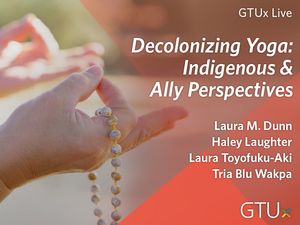In recent years, the term "decolonization" has been used to describe various social justice initiatives aimed at dismantling systems of institutional and systemic oppression in areas such as education, research, science, and healthcare. At the same time, indigenous communities understand decolonization as the reclamation of land and self-determination from Western imperialism. The divergence between these two interpretations of decolonizing yoga highlights the need for greater clarity regarding its meaning for different groups. Without establishing coherence among its disparate meanings and intentions, the term and its associated efforts risk losing their impact and becoming diluted.
The popularity of decolonization as a conceptual framework has also influenced Modern Postural Yoga. Today, individuals can participate in yoga classes and teacher trainings that focus on decolonization. In most cases, "decolonizing yoga" refers to the implementation of pedagogies that aim to restore yoga to its cultural and philosophical South Asian origins. Yet, some indigenous communities utilize yoga for decolonization as an embodied practice for healing trauma and reclaiming bodies and identities historically regulated by colonial powers. This reclamation of self and body is seen as an essential component for the liberation of spirit and flesh from oppression.
The indigenous use of yoga for decolonization provides examples of how different meanings and applications of decolonization can align around shared values such as liberation, non-violence, and ecological sustainability. Engaging in a conversation with Haley Laugher, a Navajo yoga teacher and founder of the Indigenous Yoga Instructors Association, Laura Toyofuku-Aki, Native Hawaiian co-founder of Project Koa Yoga, and Dr. Tria Blu Wakpa, an assistant professor of Dance Studies in the Department of World Arts and Cultures/Dance at UCLA, Dr. Dunn delves into the concept of "decolonizing yoga" from indigenous and ally perspectives. This dialogue illustrates how yoga and decolonization initiatives can harmonize within a holistic indigenous framework for liberation, which perceives the spiritual, individual, material, and social realms as inseparable and interconnected. Register here.
Participants:
Laura Toyofuku-Aki, Project Koa Yoga
Laura Nohealani Emiko Toyofuku-Aki is a Kanaka ‘Ōiwi (Native Hawaiian) and Japanese yoga teacher living in the Kingdom of Hawai’i on the island of O`ahu. Laura learned and began teaching trauma-informed yoga and meditation for incarcerated adults in the transgender ward at Riker’s Island and Manhattan Detention Complex and incarcerated and at-risk youth in the NYC area. In 2021, Laura co-founded Project Koa Yoga with a mission to diversify yoga and wellness spaces in Hawai’i while preserving the people, land, and culture that are Hawai’i. PKY makes yoga and wellness in Hawai’i accessible and diverse by offering a 100% scholarship-based 200-hour yoga teacher training for BIPOC and LGBTQIAmāhū+, trauma-informed, resilience-centered yoga and meditation programs for non-profits serving kānaka and marginalized folks, and free and low-cost yoga and wellness community events throughout O`ahu. Laura’s yoga and wellness is focused on fortifying a healthy and well Kānaka and Hawai`i nei.
Haley Laughter, Hozho Total Wellness
Haley Laughter is a renowned indigenous yoga instructor affiliated with the matriarchal Navajo clan system, representing the Bit'ahnii (Leaf People), Tódich'ii'nii (Bitter Water), Dibéłzhíní (Black Sheep), and Táchii'nii (Red Running into the Water). As the founder of Hozho Total Wellness, Haley has established a yoga-centered program that offers Diné and Yoga learning experiences through classes, workshops, and seminars. The primary aim of this program is to promote wellness, self-care, and healing from historical trauma through self-awareness and identity exploration. Haley is the founder of the Indigenous Yoga Instructors Association, an organization dedicated to expanding and strengthening the presence of Indigenous teachers and instructors. She was featured on the cover of Yoga Journal's Nov/Dec 2021 issue in their "Game Changers" feature for her promotion of wellness, representation, inclusivity, and the preservation of cultural integrity in both indigenous and yoga communities.
Tria Blu Wakpa, Ph.D., UCLA
Tria Blu Wakpa is an Assistant Professor of Dance Studies in the Department of World Arts and Cultures/Dance at the University of California, Los Angeles. Her research and teaching center community-engaged, decolonizing, and dance studies methodologies. She is a scholar, poet, and practitioner of Indigenous dance, North American Hand Talk (Indigenous sign language), martial arts, and yoga. Her first book project, Bodies as Battlegrounds, Institutions as War: Native American Choreographies in Confinement, historically and politically contextualizes dance, theatrical productions, basketball, and/or yoga at four sites on Lakota lands: a former Indian boarding school, men and women’s prisons, and a tribal juvenile hall. She is also a co-founder and the Editor-in-Chief of Race and Yoga, the first peer-reviewed and open-access journal in the emerging field of critical yoga studies
Laura M. Dunn, Ph.D.
Laura M. Dunn, Ph.D., is the director of the Master of Theological Studies program and the Writing Program at the Jesuit School of Theology at Santa Clara University and faculty for the Center of Dharma Studies at the Graduate Theological Union in Berkeley, California, where she teaches courses on non-dual Tantra, yoga studies, and Śāktism. She is the co-editor-in-chief of the Journal of Dharma Studies: Asian and Transcultural Religion, Philosophy, & Ethics, a peer-reviewed academic journal that employs theoretical and empirical methodologies for the intersubjective understanding of and critical-constructive reflections on Hindu, Jain, and Buddhist traditions (Dharma Studies).
Drawing from her Native Hawaiian, Chinese, and Jewish background, Laura seeks to engage the complex ways in which globalization influences religion, education, and the arts. Her current research explores the ways in which embodied indigenous epistemologies converge and diverge with somatic practices such as yoga āsana and how these practices are used to recover identity in post- and Neo-colonial contexts.
This event is online only

